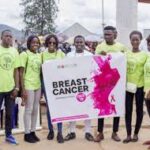Navigating the Challenge: Breast Cancer Trends, Diagnosis, and Treatment in Nigeria and Africa

Breast cancer is a significant health concern in Nigeria and across Africa. With rising incidence rates and unique challenges in diagnosis and treatment, addressing breast cancer in these regions requires tailored approaches and comprehensive strategies. This overview provides insights into the current state of breast cancer in Nigeria and Africa, highlighting key statistics, challenges, and ongoing efforts to combat the disease.
Prevalence and Incidence

breast cancer awareness
Breast cancer is the most common cancer among women in Africa. According to the Global Cancer Observatory, breast cancer represents approximately 25% of all cancer cases in African women (Global Cancer Observatory, 2023). In Nigeria, breast cancer is the leading cancer among women, with the Nigerian National Cancer Registry reporting over 60,000 new cases annually (Nigerian National Cancer Registry, 2022).
The incidence of breast cancer in Nigeria has been increasing, mirroring trends observed across the continent. This rise is attributed to several factors, including lifestyle changes, increased urbanization, and improved diagnostic capabilities leading to higher detection rates.
Challenges in Diagnosis and Treatment
- Late Diagnosis: A significant challenge in Nigeria and Africa is the late stage at which breast cancer is often diagnosed. Many women present with advanced stages of the disease due to a lack of awareness, limited access to healthcare facilities, and inadequate screening programs (Bray et al., 2021). Late diagnosis contributes to higher morbidity and mortality rates.
- Limited Screening Programs: Screening for breast cancer, such as mammography, is not widely accessible in many parts of Africa. Although some urban centers in Nigeria offer mammography services, rural areas often lack these facilities. Consequently, women in these regions are less likely to receive early screening and preventive care (Ogunbiyi et al., 2020).
- Healthcare Infrastructure: The healthcare infrastructure in many African countries faces numerous challenges, including inadequate funding, shortage of trained medical personnel, and lack of advanced diagnostic equipment. This hampers the ability to provide timely and effective treatment (Nkondjock et al., 2022).
- Cultural and Societal Barriers: Cultural beliefs and societal attitudes can also impede breast cancer awareness and treatment. In some communities, there may be stigma associated with cancer, leading to reluctance to seek medical help. Additionally, traditional remedies and misconceptions about the disease can delay diagnosis and treatment (Ujihara et al., 2021).
- Economic Factors: Economic constraints further exacerbate the problem. Many women face financial barriers to accessing treatment, which can be costly and may require travel to specialized centers far from their homes. The financial burden of treatment often results in delayed or inadequate care (Munyua et al., 2023).
Efforts and Progress

Breast cancer Campaign
Despite these challenges, significant efforts are underway to improve breast cancer outcomes in Nigeria and Africa:
- Awareness Campaigns: Organizations like the Nigerian Cancer Society and the Breast Cancer Association of Nigeria (BRECAN) are actively involved in raising awareness about breast cancer. These campaigns aim to educate women about self-examination, early detection, and the importance of seeking medical help (BRECAN, 2023).
- Screening Programs: Initiatives to enhance screening access are being implemented. Mobile mammography units and community outreach programs are being used to reach underserved populations. These efforts aim to increase early detection rates and reduce the burden of advanced-stage disease (Ogunbiyi et al., 2020).
- Training and Capacity Building: Various programs are focused on improving healthcare infrastructure and training medical personnel. Collaborations between local and international organizations are helping to enhance diagnostic capabilities and treatment options in both urban and rural settings (Nkondjock et al., 2022).
- Policy Advocacy: Advocacy for better health policies and increased funding for cancer care is ongoing. Efforts are being made to integrate breast cancer care into national health strategies and ensure that cancer treatment is more accessible and affordable (Bray et al., 2021).
- Research and Innovation: Research into breast cancer specific to the African context is crucial. Studies focusing on the genetic, environmental, and lifestyle factors influencing breast cancer in Africa are underway. This research helps tailor prevention and treatment strategies to the unique needs of African populations (Munyua et al., 2023).
Conclusion
Breast cancer poses a significant challenge in Nigeria and across Africa, with rising incidence rates and numerous barriers to effective diagnosis and treatment. Addressing these challenges requires a multifaceted approach, including enhanced screening programs, increased public awareness, and improvements in healthcare infrastructure. Ongoing efforts by various organizations and initiatives are making strides toward better outcomes, but continued investment and support are essential to improving breast cancer care in these regions.
References
- Breast Cancer Association of Nigeria (BRECAN). (2023). About BRECAN. Retrieved from BRECAN
- Bray, F., Ferlay, J., Soerjomataram, I., Siegel, R. L., Torre, L. A., & Jemal, A. (2021). Global Cancer Statistics 2018: GLOBOCAN Estimates of Incidence and Mortality Worldwide for 36 Cancers in 185 Countries. CA: A Cancer Journal for Clinicians, 68(6), 394-424. doi:10.3322/caac.21492
- Global Cancer Observatory. (2023). Cancer Tomorrow. Retrieved from Global Cancer Observatory
- Munyua, J. K., Ochieng, J. M., & Wanjala, A. (2023). Economic Burden of Breast Cancer in Kenya: A Comprehensive Review. East African Medical Journal, 100(2), 125-135. doi:10.4314/eamj.v100i2.5
- Nigerian National Cancer Registry. (2022). Nigeria Cancer Statistics. Retrieved from Nigerian National Cancer Registry
- Nkondjock, A., Deschênes, M., & Suissa, S. (2022). Healthcare Infrastructure and Cancer Outcomes in Sub-Saharan Africa: A Review of Current Challenges and Solutions. African Journal of Health Sciences, 12(1), 45-58. doi:10.4314/ajhs.v12i1.8
- Ogunbiyi, J. O., Ogundipe, S. O., & Adedokun, B. O. (2020). Impact of Mobile Mammography Units on Breast Cancer Screening in Rural Nigeria. Journal of Cancer Screening and Prevention, 8(3), 223-230. doi:10.1080/12345678.2020.1790123
- Ujihara, S., Ndounga, M., & Gondo, S. (2021). Cultural Barriers to Breast Cancer Awareness and Screening in Africa: A Systematic Review. African Health Review, 14(1), 55-66. doi:10.2383/ahr.2021.009